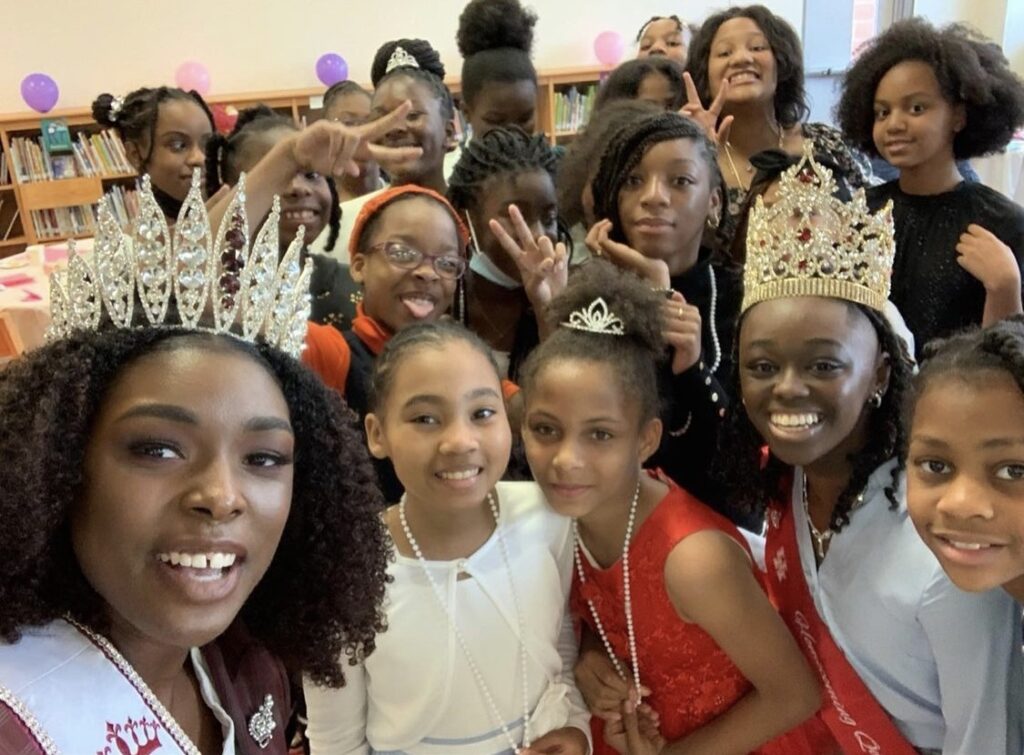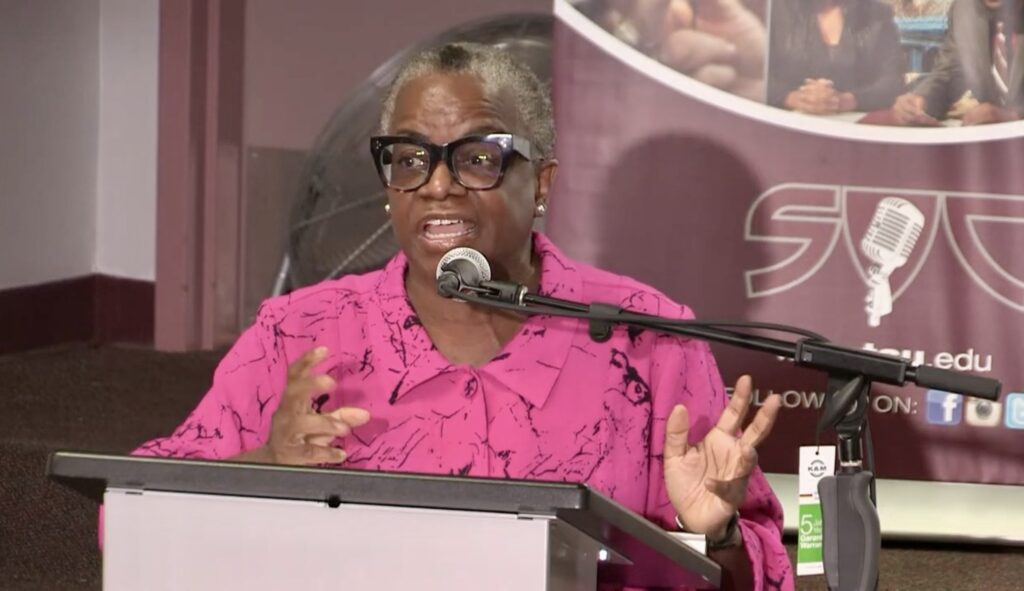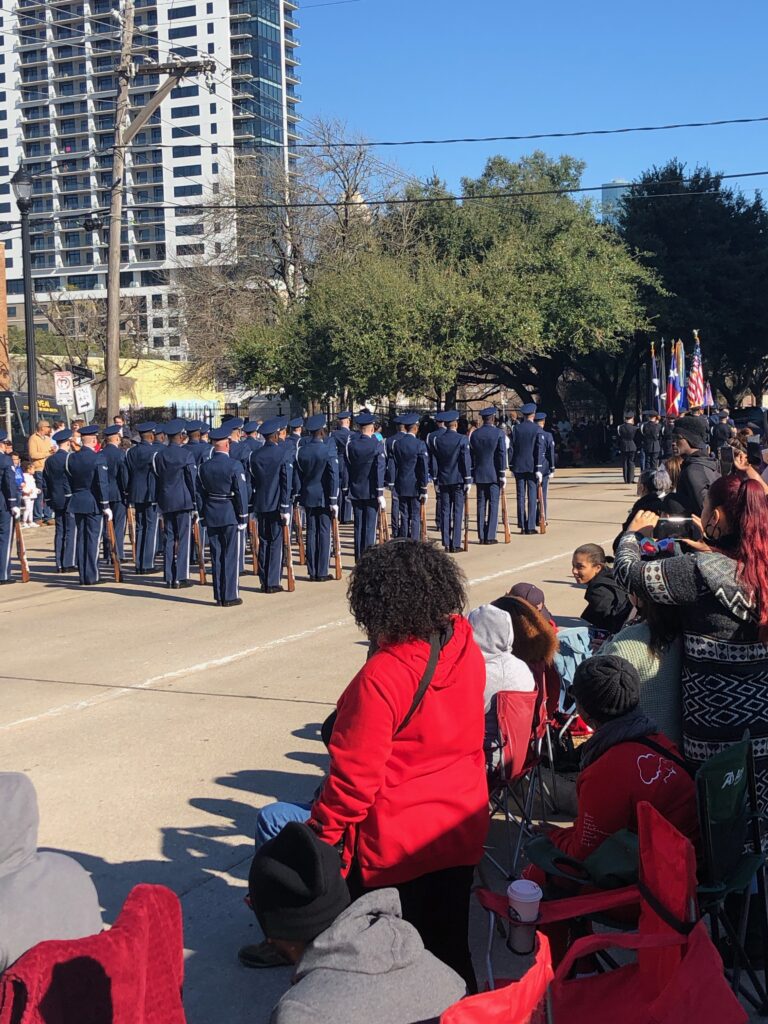A young woman’s empowering journey toward service to others, and more
Written by Christina Abay on December 19, 2021

Houston, TX— Even through a Zoom video chat, senior Mariah Campbell exudes an air of poise and assurance in her movements and speech. The conversation touched on a variety of subjects, with some poignant moments relating to her life inspirations, the daily obstacles faced by young Black women, and what motivates her to continue reaching new heights as she embarks on a journey that will empower her to contribute toward the solutions to the many problems she intends to tackle.
While Campbell is well-known on campus as the 74th reigning Miss Texas Southern University, she wishes to be remembered for more than the glitz and glamour some might associate with the prestigious title.
“I would like to be remembered for someone that was, present— of course, and always willing to lend a helping hand,” she explained. “I think that’s one of the biggest legacies that I want to leave is to not just see a problem, but to be a part of the solution.”
Campbell’s undeniable sense of responsibility toward her peers, community, and social justice are just a few of her passions. While she was inspired by a wide variety of people and experiences, one constant was her unwavering admiration and respect for her first champion, her mother, and educational icon, Dr. Thomas F. Freeman.
Campbell, who was raised in a single-parent household, credits her mother’s “strength” and determination to make ends meet as a major source of inspiration for her life. When the Longview native feels overwhelmed by the rigors of her schedule or life in general, she recalls instances when her mother accomplished the impossible with little to show perseverance in the face of adversity.
“I can do this,” she reminds herself, regardless of the circumstance, “I am resilient, I am powerful, and I am going to make a way out of no way!”
Campbell is also inspired by her meeting with the late Dr. Thomas F. Freeman during his 100th birthday celebration. She praises him in particular for taking the time to speak with her one-on-one, a gesture that has stayed with her to this day.
“He really, really, really spoke to me,” she reflected. “We sat there for hours talking about life and purpose and things like that,” said Campbell.
“Dr. Thomas F. Freeman is definitely a huge inspiration to me, finding my purpose, me pursuing God, so much that we talked about in that conversation that really inspired me to do what I do and to continue to move forward in finding my purpose and helping others along the way.”
A purpose that daily strengthens her faith in God. Campbell recalled moments when doubt crept in, but she credits God with being her “anchor” throughout.
“My motivation each day is God because sometimes life just gets so tough and so hard that you feel like you can’t even make it,” she said. “Having those moments where I had panic attacks and things like that. So, I have faced those things.”
74th Miss Texas Southern University, Mariah Campbell
She remembered a period during her adolescence when she faced severe bullying from her peers due to her “dark-skinned” complexion and natural hair. Around this time, Campbell began to feel the weight of her father’s absence, resulting in feelings of “low self-esteem, depression, and rejection.”
Campbell’s sense of obligation stems from her triumphs over adversity, not only to those facing similar challenges but also to those whose journeys she cannot fathom.
When it comes to mental health, the reigning Miss. TSU is a firm believer in “patience” with herself considering the workload and other pressures she piles on.
Campbell, who has held additional leadership positions throughout her collegiate career, including Miss Junior and director of campus Pals, emphasized the importance of “time management” in response to how she balances her studies, personal well-being, and other responsibilities as an undergraduate. When the “huge planner” schedules her entire week, she describes how meticulously planning her time eases her mind and alleviates the toll of work.
“I like to have things set for my entire week, which a lot of people find frustrating,” said Campbell. “But I mean, that’s what keeps me mentally sound, but also keeps me on top of what it is that I have to accomplish that week.”
“I’m making lists of all the things that I need to get taken care of, but also making sure that I make time for myself as well— which I think is something that a lot of people don’t take advantage of.”
When Campbell is not attending to her responsibilities as Miss TSU, she uses her free time to indulge in old hobbies while attempting to incorporate some much-needed self-care time.
In terms of her personal music collection, she’s a little bit old school. Proclaiming that she is likely “older” than her mother. It was difficult to ignore the undeniable joy music brings to Campbell’s life — most likely due to a shared preference between mother and daughter. Her unbridled passion for music inspired her to begin her own collection of classic works.
“I actually have a record collection with vinyl records, and so I spend a lot of time doing that,” she explained, adding that other hobbies have a similar therapeutic effect on her. “It kind of calms me. I’m a big person on TV and movies, so I love to watch a good movie or a good television show.”
“I also like to shop, so sometimes whenever you know, the bank allows,” she quipped. “I’ll go ahead and go to the store and look through those racks. I’m big on thrifting, so that’s easy to just save money, but to go to thrift stores.”
Campbell’s enduring message, on the other hand, is one of always knowing who you are, regardless of who is perceiving you.
One of the most significant obstacles women, particularly Black women, face, she theorizes, is the multitude of roles they are expected to fill while also serving as a source of strength with little regard to their mental health. Being “authentic” to oneself, Campbell argues, translates not only into prioritizing one’s mental health but also into an understanding of one’s limits in order to establish boundaries that prevent others from dimming one’s light.
“Don’t ever dim your light for someone else. And that’s something that I’m learning each and every day because it’s like so many people have their own insecurities, their own intimidations, and things like that, “she explained. “But you should know as a woman that you are powerful and that nobody, nobody has the authority to change that.”
In a society where women of color, particularly Black women, must learn to navigate corporate America’s already distorted view of them, the “angry Black woman” trope is a tired one that is frequently used to gaslight numerous workplace grievances raised by Black women. The layered microaggression behind one employee being described as blunt, attentive, and introverted, while the other being described as unpolished, indifferent, and withdrawn, demonstrates the cognitive conditioning imposed by the prevailing culture.
Campbell responds that acknowledging one’s inherent authority provides validation when confronted with work-related obstacles. She feels that channeling such strength will help many Black women gain confidence as they join the workforce.
“Whenever we get into these spaces, like corporate America and things like that, we’ve been taught for so long to suppress who we are or to change how we are, what we look like, and things like that to accommodate other people’s feelings, but I think embracing who you are and walking into each room with the confidence of knowing that you are worthy.”
Campbell’s genuine warmth and sincerity as she discussed her varied passions was the most engaging aspect of the meeting. As she explored a variety of subjects, she shed light on the legacy she wishes to leave at TSU and, more importantly, on how her classmates will remember her.
“That’s one of the biggest things that I can just help where I can, but also be present because when it comes to people when they come and talk to me,” she explained. “Sometimes people don’t need it […] They need somebody who’s listening to just fill their hearts at that moment.”
“I think that’s one thing that I want students to remember me by somebody ‘that always showed up and was there when I needed them’ but also, somebody that wanted to help in any way that they can.”







